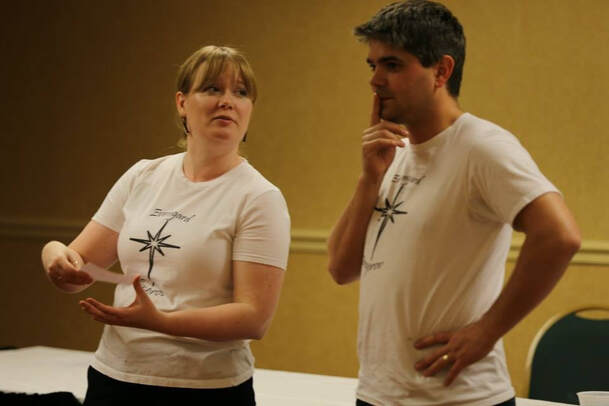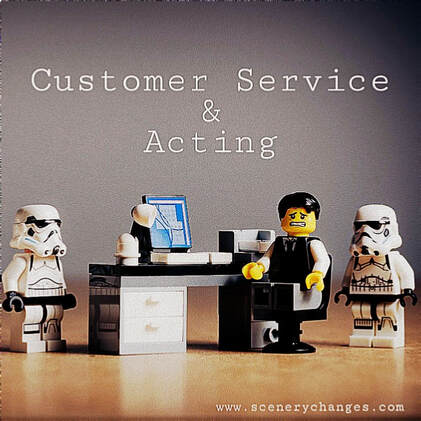|
Most of the time when you think about choices in acting, it is self-driven motivations and discoveries that come to mind. However, re-acting is an equally important element of performance, where you consider how your character will respond to the situations and other characters around them.
Reacting in opposing ways can add great complexity to a character. Perhaps they are an overbearing, antagonistic boss, but when their wife or mother appears, they become sheepish and submissive. Perhaps the character is easily manipulated and taken advantage of by others in positions of power, but they command total control over their own household or domain. Discovering how your character addresses conflict, confusion, or unforeseen circumstances will give you a great depth of insight into their construction, and add a rich layer to your portrayal. Here are some questions to consider:
Of course the questions you ask about your character’s reactions will be largely determined by the scenes, setting, and play you are participating in, but hopefully this is a good starting point for you to build from. One of my favorite examples of re-acting and how it can dynamically change a scene is in the television show “Black Books”. The character of Bernard, played by Dylan Moran, is a cantankerous curmudgeon that can’t stand most people and his reactions to them fit accordingly. His response style does not change throughout much of the series, except in one particular episode, when he meets a charming male explorer. Bernard’s reaction to this man is completely out of the norm. He is giddy, polite, considerate, even flirtatious. This made it a spectacular performance to watch, because his response to this new player was nothing that we as an audience had come to expect. So have fun exploring how you will not only act, but re-act as your character, and break a leg. -L.N. I recently had a conversation with a fellow performer about how customer service skills can benefit an actor. The two may seem disjointed at first, but I propose that they are more similar than you think. In customer service you are seeking to provide your client with an excellent experience, and as a performer you try to do the same thing.
Working in various customer service positions over the years, I developed the mantra, “let’s find out together.” If a client asked a question that I did not know the answer to, it presented an opportunity for us both to learn. I also employed the substitution method, where I would propose an alternative if I did not have the item they were seeking. For example, if a customer wanted a cat key chain, but we did not have any, I would show them our cat bookmarks, stationary, or jewelry instead. You may be thinking, “well, that worked great on a sales floor, but what does it have to do with acting?” I’m glad you asked. In venue-specific performances, you will often get asked questions you do not know the answer to, like “where are the bathrooms?” or “where is this certain vendor?” Instead of simply brushing the patron off, you can recognize that you are part of the world of the play, and you can help them find the answer. This is a bonus because you will end up learning the correct response when you are undoubtedly asked again. In street character acting, we call the substitution method flipping the situation. The goal is to take a subpar or negative experience and turn it into a positive one. An example of when I got to employ both the substitution method and the willingness to help find a solution was when I was performing at the Kansas City Renaissance Festival. A family approached me with a few young girls who were very excited to see the mermaids but were unsure of where to find them. Now I could have said, “I’m a stage act, directing you around the fair isn’t my job,” but that would have been poor customer service and would have undoubtedly left a negative impression on the patron. Whether you call them patrons, clients, audiences, or customers, they are one and the same. They are money-paying individuals who have chosen to invest in you, and in return you should do your best to provide a quality experience for them. Now you cannot make everyone happy, that is a fact. Still, as a general rule, if you approach a situation or role with an attitude of willingness to provide excellent service, you will get a lot farther in the acting business and in your own performance than without it. Back to my example. Instead of turning the family away, I remained in character and said, “Mermaids! How exciting! Let’s find them together.” I then found out where the mermaids were and escorted the young family to the location. Sadly, when we reached the cove, the performers had already left for the day. I saw the little girls’ faces fall in disappointment. Opportunity number 2 to go above and beyond. It was time to make a substitution and flip the situation. I expressed empathy that we had just missed the mermaids and used my character’s motivation to tell stories, to create a new and happy memory. I smiled and said, “I know, why don’t we tell a story about mermaids together and I shall give you a piece of that story to take home so you can remember it and all the fun you had today forever.” After telling a tall tale of mermaids and aliens and fuzzy blankets and many laughs and smiles and small tokens I had made later, the family left with a good memory, excellent customer service, and if I say so myself, one heck of an acting performance. Everyone likes free gifts, especially if it’s something you can use. And lucky for you, I know exactly the best gift you could ever want. See how cute and furry it is? Oh, I’m sorry. I forgot you were allergic. What’s happening to your face? Giving a gift in improv is exactly like the scene I painted in your mind. I gave you something cute and fluffy, like a kitten. I then gave something to help you react to the gift… literally. You became allergic to the pet I tossed in your arms and responded in your mind to the gesture. Sorry about the rash. It will clear up soon. The three questions to ask when giving a gift are:
When doing an improv scene, specifically in the character build-up, it is important to establish certain quirks in each actor. I could have said, “oh, look at that kitten,” which would also add a small gift to the scene. However, with adding and not giving to the scene or your character, the weight falls on you to give it purpose to the scene. A good improviser could pick it up and run with it (and you’re smart so you would probably run out of the scene), yet it becomes more of a burden for you to continue. As an improv actor, I must improve my partner and help them through the scene. By adding extra character development, and adding a gesture, I helped carry the scene to you. The dialogue becomes meaningful and fun in its own way. Tossing kittens around may not work all the time (and you’ll get a call from the ethics committee), so that is why we Rolodex the best idea before we give the gift. Once I gave the gift, or threw it in this case, you must choose to accept it and give another. This is the basic concept behind the “Yes, and” rule of improv acting. By the way, here’s some ointment for that rash… ignore the poison logo. So what was one of your best gifts, or scene moments you shared with someone on or off stage? "What are five new titles for this post?" How to Rolodex; Improvodex; 5 Things Connected; All the Ideas; Flippy Paper in My Mind.  Professional improvists have been using this simple technique to boost their wit for years. In fact, you can watch some of them using it in any outtake on your favorite comedy. Some shows even use Rolodexing as their main form of comedy. Yet, they will flip through some of the fluff that gets weeded out in their mind (don't worry, I will explain how to find the best answer in a moment). But now is the time for a no hesitation game! "Speak before you think" is the idea behind this trick. It gets rid of those silly inhibitions you may have as you are acting out an improvised scene or if you want to spark some life into your dialogue. How to play the Rolodex warm-up:
Variations:
"So this is a great way to kill some time on a car ride, but what is the benefit?"
I'm glad you asked for now is the moment we turn five bars of lead into gold. While answering questions with the Rolodex warm-up, your mind is being conditioned for a plethora of answers to any question or scenario. While performing, this technique is often done in your mind. All you have to do is pick the right answer that offers the most to the scene. Something that will help the others spring the scene forward. In improvisational acting, you must always give a gift to your partners. So be sure to try the increasingly popular Improvodex: a brand new invention from the minds who brought you Void Violets, Stew the Lamb, and the Bowling Dive. Available now at comedy shows everywhere. |
Details
Categories
All
Archives
June 2023
|






 RSS Feed
RSS Feed